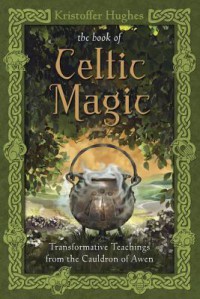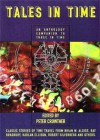Currently reading
The Book of Celtic Magic

by Kristoffer Hughes
To start with this book has some beautiful cover art. I don't usually comment on bookcovers in reviews, but this one is both organic and magical and definitely made me want to pick up the book to see what it was about.
For anyone looking for a comprehensive explanation of the Druidic religion as it is practiced today, this is it. Hughes very clearly explains the definition of what is Celtic, something that isn't as simple as a specific tribe or nationality. He goes on to mention that the tradition represented in this book is based on Welsh roots rather than the Irish Celtic tradition which has been covered in many other books.
He succinctly describes a mytho-centric belief system wherein a pantheon of gods and goddesses and their mysteries are an inherent part of ritual and practice, as well as the role that singing and verse play in this form of magic. Hughes also gives sources, some of them not commonly known, for the historical basis of the tradition that is described. The Tale of Taliesin features highly.
I was pleased that he explains the particularly Druidic term 'Awen', the divine spirit of inspiration. This was something that people unfamiliar with the Pagan traditions and especially with modern Druidism may have needed clarification on.
Hughes also does a good job of explaining 'magic' in terms of natural forces. The philosophy expounds that all things are connected and everything we say or do affects the world around us. There are explanatory historic references of folk magic in Wales that tie history and modern tradition together.
Hughes does assume that the reader practices certain conventions, like keeping a journal, but he also reminds us of the accepted ethics in religions that practice magic and warns of natural consequences.
I'm not sure if I could agree with his statement that a magician must live a life of servitude, but the spirit of the idea of doing good is sound. Parts of the book did seem moralistic, but the explanation about living a magical life and direct consequences for magical actions is well placed.
The whole book is rich with symbolism and contains many meditation exercises to fully embrace the information imparted. I found some of the given rituals repetitive for my taste, but who am I try argue with the traditions of others?
Hughes explains that the Celtic tradition includes ritual other than the well-known Gardnerian formula and the Celtic connection to land, sea and sky as the elements, also explaining where fire fits in to this alternate view.
He emphasises planning and assessing reasons for performing ritual and offers ritual formulas with many variations to suit individual taste. There is a large section about magical allies or guides as well as Celtic gods and goddesses. Here he seems to qualify the information with a concession to those who choose not to believe in these deities. Do they exist or not? I appreciate that he's leaving room for disagreement, but I'm reading about his system and beliefs so why hedge?
I especially liked the material on the genius loci, or place spirits, which correlates with information I've read on these elsewhere.
Hughes asks us to use our imaginations and follow guided journeys through visualization. He draws on his personal experience and encourages the reader towards self evaluation as to why they want to do magic.
He shows us the meanings behind Ogham script and the significance of the wand and cauldron in Celtic ritual, and also teaches us a mixture of folklore and herbal medicine and where animals fit into this magical philosophy, often appearing as teachers.
Near the end of the book, he shows us a form of divination specific to this system that I haven't seen before.
I would recommend this book to anyone who wants to study modern Druidry or who just wants to round out their knowledge of Pagan paths with something different than the plethora of books on Gardnerian tradition. I found it interesting and informative.
 2
2





